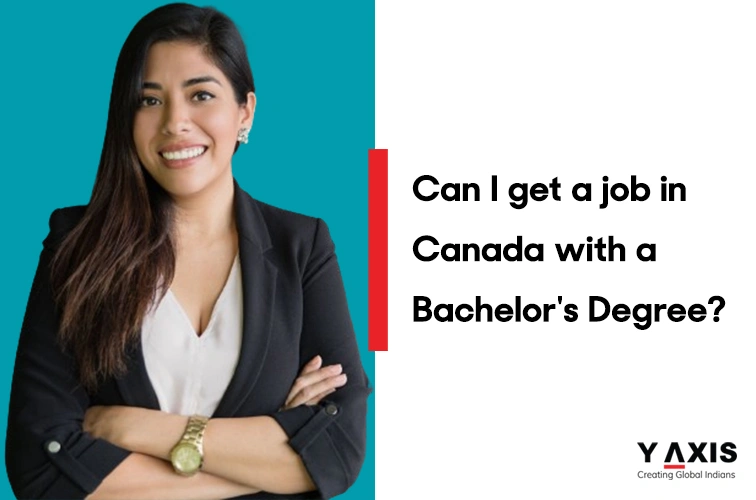Posted on September 17 2024
Can I get a job in Canada with a bachelor's Degree?
By , Editor
Updated September 17 2024
Yes, you can get lucrative and high-paying jobs in Canada with a bachelor's Degree, depending upon the stream or discipline you have studied. Canada has over 1 million jobs in 20+ sectors, and the minimum educational requirement for most of the jobs is a bachelor's Degree in a relevant field. You can get some of the highest-paying jobs in Canada with a bachelor's Degree in IT, computer science, engineering, surgery, pharmacy, physiotherapy, finance, business administration, hospitality, or tourism.
*Want to work in Canada? Y-Axis is here to provide complete assistance!
Jobs in Canada with a bachelor's Degree
The table below lists the in-demand jobs in Canada that require a bachelor's Degree to be eligible:
|
Job Role |
Minimum Degree required |
Average annual salary (in CAD) |
|
Web developers |
Bachelor of Technology (BTech) in Computer Science and Engineering |
$72,627 |
|
Data Scientist |
Bachelor of Science (BSc) in Computer Science |
$96506 |
|
AI specialists |
Bachelor of Engineering (BE) in Information Technology |
$63,886 |
|
Software Engineers |
Bachelor of Science (BSc) in Software Engineering |
$91,832 |
|
IT technician |
Bachelor of Engineering (BE) in Information Technology |
$62643 |
|
Mechanical Engineers |
Bachelor of Technology (BTech) in Mechanical Engineering |
$78,276 |
|
Electrical engineers |
Bachelor of Engineering (BE) in Electrical Engineering |
$92349 |
|
Civil Engineers |
Bachelor of Technology (BTech) in Civil Engineering |
$89365 |
|
Environmental engineering |
Bachelor of Technology (BTech) in Environmental Engineering |
$80,000 |
|
Registered nurses and registered psychiatric nurses |
Bachelor of Science in Nursing (BSc Nursing) |
$70,975 |
|
Doctors |
Bachelor of Medicine, Bachelor of Surgery (MBBS) |
$118,475 |
|
Pharmacists |
Bachelor of Pharmacy (BPharm) |
$89,314 |
|
Physiotherapists |
Bachelor of Physiotherapy (BPT) |
$86,451 |
|
Veterinarian |
Bachelor's Degree in veterinary science and animal husbandry |
$95,804 |
|
Lab technicians |
Bachelor of Medical Laboratory Technology (BMLT) |
$54,552 |
|
Business and Office Administration Instructor |
Bachelor of Business Administration (BBA) |
$44,379 |
|
Financial Analyst |
Bachelor of Commerce (BCom) in Finance |
$102,334 |
|
Human Resource Managers |
Bachelor of Business Administration (BBA) |
$70,000 |
|
Marketing analysts |
Bachelor of Marketing Management (BMM) |
$93,798 |
|
Accountant |
Bachelor of Commerce (BCom) in Finance |
$56,257 |
|
Investment banking associate |
Bachelor of Commerce (BCom) in Finance |
$107,260 |
|
Payroll administrator |
Bachelor of Commerce (BCom) in Finance |
$60,000 |
|
Assistant Bank manager |
Bachelor of Commerce (BCom) in Finance |
$71,749 |
|
Business Analyst |
Bachelor of Business Administration (BBA) |
$93,734 |
|
Hotel manager |
Bachelor of Hotel Management (BHM) |
$53,933 |
|
Event coordinator |
Bachelor of Hotel Management (BHM) |
$49,766 |
|
Restaurant manager |
Bachelor of Hotel Management (BHM) |
$46,590 |
|
Travel Consultant |
Bachelor of Tourism and Travel Management (BTTM) |
$42,500 |
|
Tourism officer |
Bachelor of Tourism and Travel Management (BTTM) |
$85,164 |
|
Content Creator |
Bachelor of Arts (BA) |
$58,500 |
|
High school Teacher |
Bachelor of Education (B.ED) |
$69,713 |
|
Graphic designer |
Bachelor in graphic design |
$51,481 |
|
Creative Director |
Bachelor of Arts (BA) |
$113,058 |
|
News editor |
Bachelor of Arts (BA) in Journalism or English |
$74,863 |
|
Journalists |
Bachelor of Arts (BA) in Journalism |
$52,060 |
|
Gallery Assistant |
Bachelor of Arts (BA) in Fine arts |
$35,958 |
|
Cultural heritage specialists |
Bachelor of Arts (BA) in Fine arts |
$52,652 |
|
Forestry technician |
Bachelor of Arts (BA) in Geography |
$54,473 |
|
Meteorologists |
Bachelor of Arts (BA) in Meteorology |
$66214 |
|
Mining researcher |
Bachelor of Arts (BA) in Geography |
$49,100 |
|
Copyeditor |
Bachelor of Arts (BA) in English |
$57,038 |
|
Proofreader |
Bachelor of Arts (BA) in English |
$70,000 |
|
Content writer |
Bachelor of Arts (BA) in English |
$51,023 |
|
Analytics manager |
Bachelor of Arts (BA) in Economics |
$112,477 |
|
Tax economists |
Bachelor of Arts (BA) in Economics |
$88,903 |
|
Career counselor |
Bachelor of Arts (BA) in Psychology |
$52,865 |
|
Clinical psychologist |
Bachelor of Arts (BA) in Economics |
$112,165 |
|
Behaviour Interventionist |
Bachelor of Arts (BA) in Sociology |
$46,354 |
|
Employment specialists |
Bachelor of Arts (BA) in Sociology |
$46,879 |
*Are you looking for step-by-step assistance with Canada Immigration? Contact Y-Axis, the world’s No. 1 overseas immigration consultancy, for end-to-end support!
Tags:
Jobs in Canada
Work in Canada
Jobs in Canada
jobs in Canada for graduates
jobs in Canada with Bachelor's Degree
work in Canada
Canada work permit
highest paying jobs in Canada
migrate to Canada
Canada immigration
Share
Options for you by Y-Axis
Get it on your mobile
Get News alerts
Contact Y-Axis

